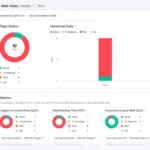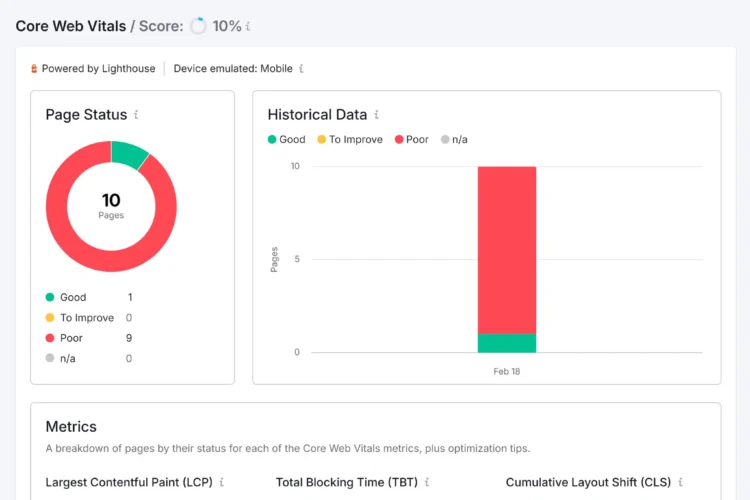
Introduction
In today’s digital-first world, patients turn to Google before they turn to their doctors. Whether they’re searching for symptoms, specialists, or nearby clinics, your healthcare organization’s online visibility can make the difference between gaining a patient or losing one to a competitor.
That’s where SEO for healthcare websites comes in — a strategy designed not only to improve search rankings but to build trust, authority, and compliance in an industry where credibility is everything.
In this article, we’ll explore how to optimize healthcare websites for search engines while maintaining compliance, privacy, and patient confidence.
Why SEO Matters for Healthcare Websites
The healthcare industry is one of the most competitive digital markets. Patients expect fast, informative, and trustworthy experiences online — and Google rewards websites that meet these expectations.
Here’s why SEO is essential for healthcare providers:
- Increases patient reach: Most patients start their healthcare journey with an online search.
- Builds credibility: Optimized, authoritative content signals trust to both users and Google.
- Supports compliance: SEO best practices align with user privacy and accessibility standards.
- Drives local visits: Local SEO helps patients find nearby clinics, hospitals, and doctors.
When done right, SEO doesn’t just bring traffic — it brings patients who are actively seeking your expertise.
1. Build Trust Through Authoritative Content
Healthcare is a YMYL (Your Money, Your Life) category — meaning Google holds these sites to the highest content standards because misinformation can directly impact users’ well-being.
To meet these standards:
- Show medical credentials: Display author bios, degrees, and certifications.
- Cite reputable sources: Reference government or medical organizations like WHO, CDC, or NIH.
- Keep content updated: Outdated medical advice can hurt credibility.
- Include peer-reviewed insights: Back claims with research and studies.
Google’s E-E-A-T principles (Experience, Expertise, Authoritativeness, Trustworthiness) are especially crucial for healthcare SEO.
2. Optimize for Local SEO
Most healthcare-related searches include local intent — for example, “dentist near me” or “urgent care in Boston.”
To dominate local search results:
- Claim and optimize your Google Business Profile (GBP).
- Ensure NAP (Name, Address, Phone Number) consistency across listings.
- Encourage patient reviews — they boost credibility and rankings.
- Add local schema markup to enhance your local visibility.
- Use location-based keywords in your metadata and service pages.
Local SEO ensures you’re visible when patients search for care within your area.
3. Improve Site Speed and Mobile Experience
Google’s Mobile-First Indexing means your mobile site is the benchmark for ranking. For healthcare sites, this is crucial — patients often search on the go.
Key optimizations include:
- Use responsive design across devices.
- Compress images and remove render-blocking scripts.
- Use a CDN for faster load times.
- Monitor Core Web Vitals using PageSpeed Insights.
Fast, mobile-friendly websites improve both rankings and patient satisfaction.
4. Ensure Compliance and Data Security
Trust and compliance go hand in hand. Healthcare websites must adhere to privacy regulations like HIPAA (in the U.S.) and GDPR (in the EU) to protect patient data.
Compliance SEO best practices:
- Avoid collecting unnecessary patient data via forms.
- Use SSL certificates (HTTPS) for all pages.
- Limit tracking cookies and third-party scripts.
- Provide a clear privacy policy and terms of service.
- Ensure accessibility compliance with WCAG guidelines.
A compliant website not only avoids legal issues but also improves trust and conversion rates.
5. Leverage Structured Data (Schema Markup)
Structured data helps Google understand your healthcare services and display rich results.
Use schema types such as:
- MedicalOrganization
- Physician
- LocalBusiness
- FAQPage
- Review
Adding schema markup increases click-through rates and can help your site appear in featured snippets — especially for medical questions and local searches.
6. Focus on Patient-Centered Keywords
Keyword strategy in healthcare should align with patient intent, not just medical terminology.
For example:
- Instead of “otolaryngology clinic,” use “ENT specialist near me.”
- Instead of “hypertension treatment,” use “how to manage high blood pressure.”
Use tools like Google Search Console, Ahrefs, or SEMrush to find real patient search terms.
Incorporate these naturally into your content and FAQs for better visibility.
7. Create Helpful Resources and Blogs
A content hub filled with educational articles, FAQs, and treatment guides builds authority and attracts organic traffic.
Example topics:
- “How to Choose the Right Primary Care Physician”
- “Understanding Diabetes: Symptoms, Risks, and Prevention”
- “Top 10 Dental Hygiene Tips for Kids”
Regularly updated content not only engages patients but also signals expertise to Google.
8. Track and Improve SEO Performance
Use Google Analytics and Search Console to measure your progress:
- Track keyword rankings and impressions.
- Monitor mobile usability reports.
- Analyze click-through rates and bounce rates.
- Measure conversions (appointment bookings, calls, form fills).
Adjust your strategy based on data — healthcare SEO is about continuous optimization, not one-time setup.
Conclusion
SEO for healthcare websites goes beyond ranking — it’s about building credibility, maintaining compliance, and connecting with patients at every stage of their healthcare journey.
By combining E-E-A-T principles, local optimization, technical SEO, and compliance standards, healthcare providers can create a trustworthy digital presence that drives long-term growth.
In healthcare, trust is everything — and SEO is how you earn it online.
FAQs
1. What is SEO for healthcare websites?
SEO for healthcare websites involves optimizing medical or clinic websites to improve visibility in search engines while maintaining compliance, authority, and patient trust.
2. Why is local SEO important for healthcare providers?
Local SEO helps patients find healthcare providers in their area, boosting visibility for clinics, hospitals, and specialists in “near me” searches.
3. How can healthcare websites stay compliant with SEO?
Use secure HTTPS connections, maintain HIPAA/GDPR compliance, and clearly display privacy policies. Avoid collecting sensitive data unnecessarily.
4. What are the best keywords for healthcare SEO?
Focus on patient-centered keywords like “doctor near me,” “best cardiologist in [city],” or “how to manage diabetes” instead of technical medical terms.
5. How can I track SEO performance for my medical website?
Use tools like Google Analytics and Search Console to monitor traffic, keyword rankings, and patient engagement metrics such as appointment bookings or form submissions.
Other SEO services include – SEO Agency in Madhapur | SEO company in Ameerpet | SEO services in Hitechcity | SEO services in kukatpally | SEO services in Bangalore





